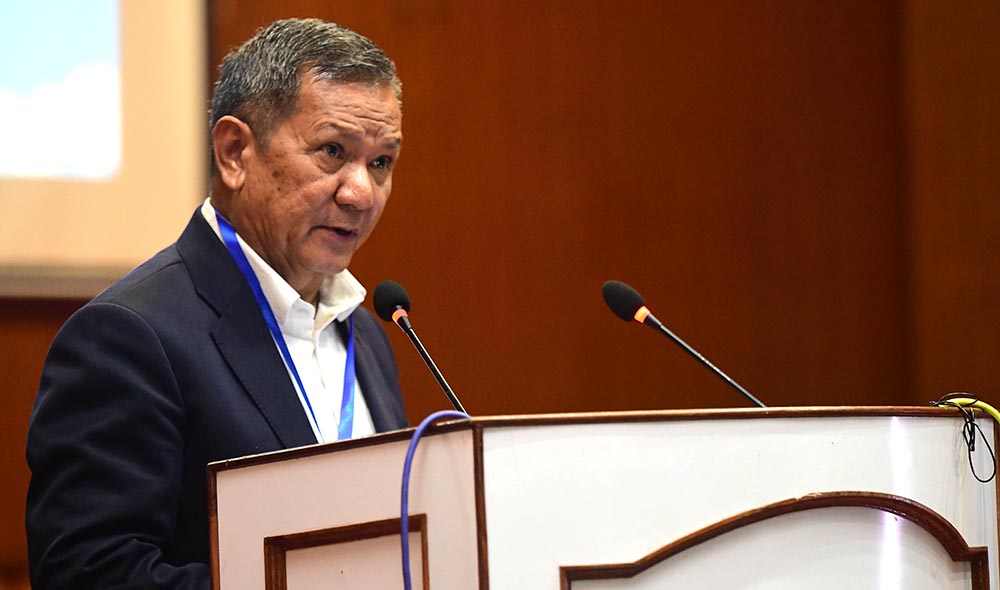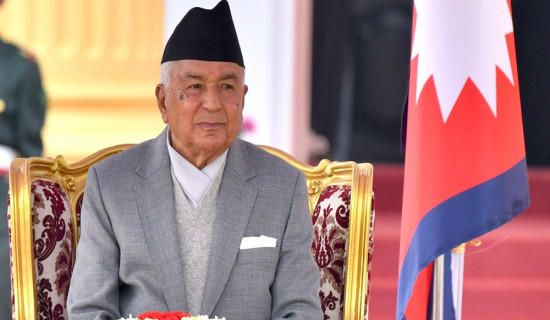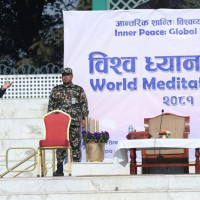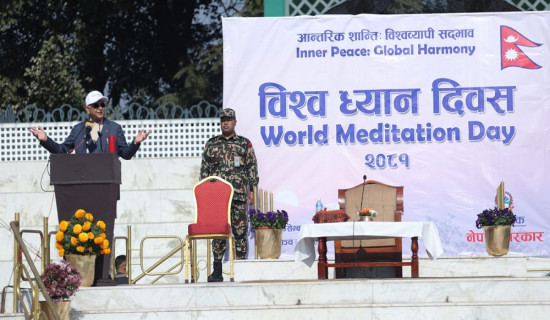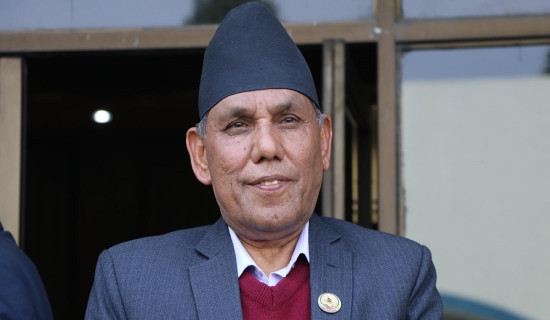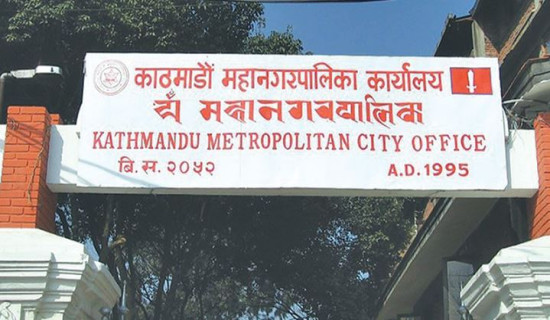- Saturday, 21 December 2024
Govt committed to enhancing digital communication: Minister Gurung
By Kedar Timalsina, Banepa, Oct 2: Minister for Communication and
Information Technology Prithvi Subba Gurung has said that the government is
committed to enhancing digital communication for improving public governance.
Minister Gurung said so while inaugurating the Second Pan-Himalayan
Communication and Social Development Forum at the Kathmandu University in
Dhulikhel today.
"The
Government of Nepal is committed for enhancing Digital communication for
improving Public governance. We believe, it is a Change Agent for
Transformation, growth, and inclusivity. It represents our commitment to
building a better, more connected Nepal for future generations," said the
Minister. (See the full text below)
The four-day forum Is co-organized by the School of Public Administration of the University of Electronic Science and Technology of China, the Department of Language and Mass Communication of the Kathmandu College of Humanities and Kangba TV.
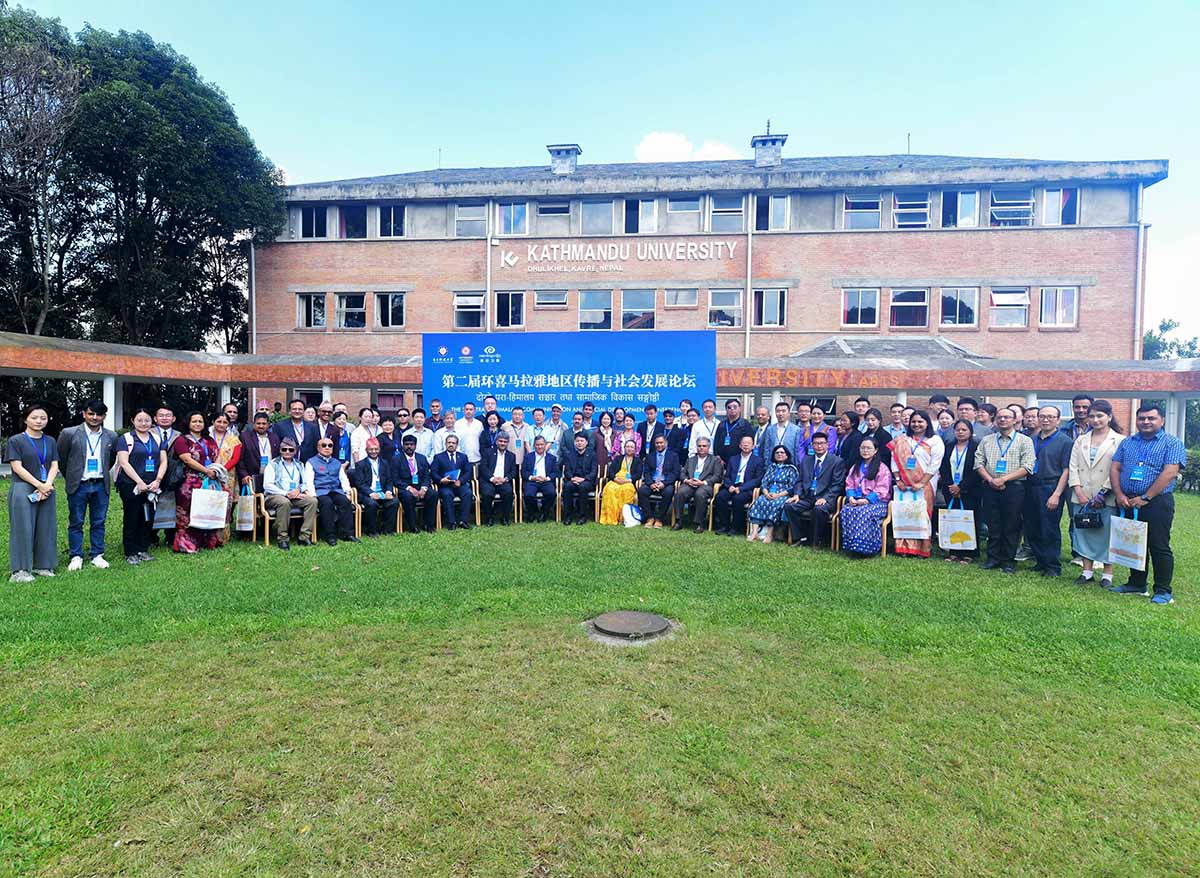
At the opening ceremony, Prithvi Subba Gurung, Minister of
Communications and Information Technology of Nepal, Professor Hu Jun, President
of the University of Electronic Science and Technology of China, and Professor
Achyut Wagle, Vice President of Kathmandu University, delivered speeches to
congratulate the convening of this international conference.
The keynote speakers also expressed that in order to promote the
high-quality development of the joint construction of the "Belt and
Road" and further promote the sharing of achievements, mutual benefit,
cultural exchange, people-to-people exchanges and long-term peace and stability
in the Pan-Himalayan region in the digital era, scholars from many countries
will discuss in depth the construction of a community of shared future in the
Pan-Himalayan region.
This international conference aims to share the research results of
multidisciplinary co-construction such as news communication, public
management, political science, history, etc. based on digital communication,
and express their own views, in order to have deeper exchanges and mutual
learning in the fields of public management and social governance, information
exchange and communication, education and culture in the future.
In the next few days, more than 100 famous scholars, professors and
young scholars from 8 countries including China, Nepal, the United States,
India, the United Kingdom, Pakistan, Sri Lanka and Bhutan will discuss hot
topics in public governance and social development in the Himalayas on topics
such as "digital communication and public governance",
"digitalization and urban and rural social development",
"regional development and cooperative governance",
"cross-cultural communication and ethnic exchanges and integration",
and "building a community of shared future in the Himalayas".
Contribute to promoting regional mutual trust, peaceful development and
the construction of a community of shared future.
The delegates will also conduct media industry research in Nepal, visit
TV stations and newspapers, and lay a good foundation for future cooperation
and development between China and Nepal in the media.
Full text
of the Minister's speech:
Honorable
Guests, Distinguished Colleagues, Ladies and Gentlemen,
• It is my great pleasure to be here in
Kathmandu University today to discuss an issue of Digital Communication and
Public Governance in this conference.
• I wish the grand success of the
program , on behalf of myself and also on behalf of the government of Nepal,
• As we know the complexities of the
21st century, digital transformation has become a key driver in enhancing
public governance and ensuring transparent, efficient, and accessible services
delivery for all.
• Here, I would like to focus on the key
elements of digital communication and public governance, focusing on
infrastructure development, digital literacy, cyber security, and the broader
goal of a "Digital Nepal."
• Now, Nepal has made significant
efforts in improving its digital infrastructure. Massive expansion of
Telco networks, the growing penetration
of mobile devices and internet, increasing
adoption of digital platforms have transformed the way we communicate and
access information. We are committed to develop our digital ecosystem to
enhance governance, empower citizens, and promote socio-economic development.
• Ministry has prioritized new
formulation and radical changes in the existing policies, laws and structures.
Draft of IT and cyber security Act has been sent for stakeholder's ministry's
consent. Integrating digital communication into public governance can lead to
more responsive, transparent, and efficient government services.
• Ministry have formulated National
Cyber Security Policy 2080 and established The National Cyber Security Center.
Moreover, Social media operation and management directive is under
implementation and social media regulation bill is being prepared for secure and
responsible use of social Medias.
• Ministry has prioritized the effective
implementation of Digital Nepal Framework 2019. With the aim of making the
Digital Nepal Framework more effective and address new digital transformation
agendas, Ministry is updating current framework.
• Ministry has published a concept paper
related to the use and practice of Artificial Intelligence (AI) in Nepal. I in
Nepal. National A.I. Policy formulation is in progress.
• Integration of National Identity Card
Management System and Nagarik App is high priority of government for better
outreach of e-services to public.
•
• Government of Nepal has aimed to build digital public
infrastructure through the effective implementation of programs in the digital
foundation under the Digital Nepal Framework. For the successful implementation
of the Sustainable Development Goals 2030, digital public infrastructure should
be prioritized and the government's policies and programs are also in the same
direction. As mentioned in budget speech of Government of Nepal for Fiscal Year
2081/82, government has prioritized establishment of information technology hub
and establishment of a knowledge park at Khumaltar, Lalitpur. These will be
foundational pillars for implementation of the information technology decade.
The government is in the process of creating detail implementation plan.
• Government of Nepal is ready to
address policy, legal and infrastructural hurdles for digital transformation
however, private sector
• Building a digital ecosystem with
sustainable infrastructure is possible only through the collective efforts of
all stakeholders rather than the efforts of a single government. Digital
communication is at the heart of modern governance. It enables us to connect
with citizens in real time, share information efficiently, and deliver services
more transparently. Through e-governance, we are gradually moving away from
traditional bureaucratic systems, bringing services directly to the fingertips
of our citizens. National E-Government Master Plan , Broadband Network
Expansion, the Optical Fiber Backbone Network , and the 4G and beyond network rollout nationwide are essential for increasing internet access,
particularly in rural areas. Nepal Digital Literacy Campaign and The National
Cyber security Policy will ensure that as we digitize more services, we
maintain the trust of our citizens by safeguarding their information. The
pillars of digital communication lay the groundwork for connectivity, security,
and interaction including rapid innovation
and increased global connectivity.
• Looking forward, our vision for a
Digital Nepal is clear. We aim to create a knowledge-based society where
information and technology are fully integrated into all aspects of public and
private life. By leveraging digital communication and governance, we aspire to
build a more inclusive, transparent, and prosperous Nepal. This journey
requires the combined efforts of all stakeholders—government, private sector,
civil society, and international partners. Together, we can create a digital
ecosystem that serves all citizens and ensures that Nepal is prepared for the
challenges and opportunities of the future.
• The Public governance associates
frameworks, processes, and institutions through which public decisions are made
and authority is exercised in a society. It involves the structures of
government, the policies implemented by public authorities, and the mechanisms
by which citizens, businesses, and civil society interact with these
structures.
Ladies and
Gentlemen,
• In conclusion, The Government of Nepal
is committed for enhancing Digital communication for improving Public
governance. We believe , It is a Change Agent
for Transformation, growth, and inclusivity. It represents our
commitment to building a better, more connected Nepal for future generations.
• We want to set the image of public
governance with high integrity to ensure
that public resources are managed effectively, and that decisions made serve
the common good while being transparent, accountable, and responsive to the
needs of the people. We want to set as building blocks of democratic governance
with the involvement of Public governance in collaboration between different
levels of government (local, regional, national), and also with private and non-governmental
organizations. We want to join our hands together to raise the level of society
as well as the members of the society thorough matured digital communication
system and transparent public Governance.
• As our dream of “Digital Nepal”. We are planning for Strategies and action
plans for E Governance Implementation in Nepal by using innovative technologies
as well as interconnect with the Information world by internalizing the
required ICT initiatives to make Digital Nepal a grand success.
• At last, I would like to extend my
sincere thanks to the organizer and to all official members of this Conference.
Special thanks and regards to the
Kathmandu University organizer team for your kind invitation
Thank you so much !

